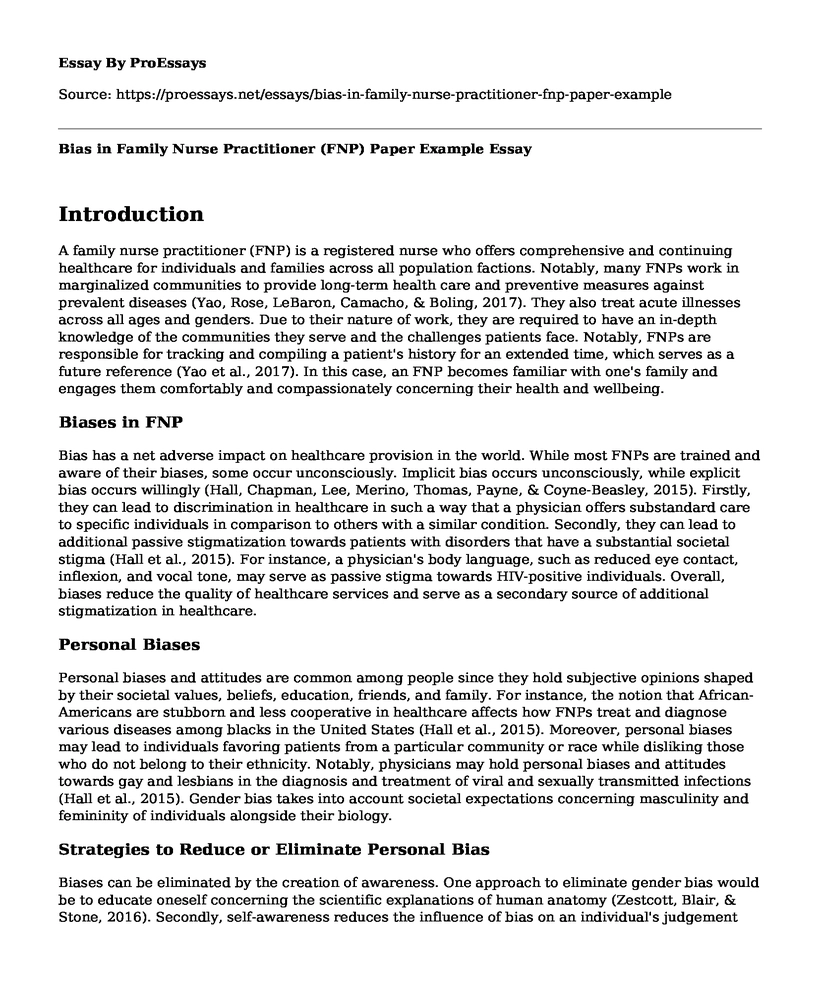Introduction
A family nurse practitioner (FNP) is a registered nurse who offers comprehensive and continuing healthcare for individuals and families across all population factions. Notably, many FNPs work in marginalized communities to provide long-term health care and preventive measures against prevalent diseases (Yao, Rose, LeBaron, Camacho, & Boling, 2017). They also treat acute illnesses across all ages and genders. Due to their nature of work, they are required to have an in-depth knowledge of the communities they serve and the challenges patients face. Notably, FNPs are responsible for tracking and compiling a patient's history for an extended time, which serves as a future reference (Yao et al., 2017). In this case, an FNP becomes familiar with one's family and engages them comfortably and compassionately concerning their health and wellbeing.
Biases in FNP
Bias has a net adverse impact on healthcare provision in the world. While most FNPs are trained and aware of their biases, some occur unconsciously. Implicit bias occurs unconsciously, while explicit bias occurs willingly (Hall, Chapman, Lee, Merino, Thomas, Payne, & Coyne-Beasley, 2015). Firstly, they can lead to discrimination in healthcare in such a way that a physician offers substandard care to specific individuals in comparison to others with a similar condition. Secondly, they can lead to additional passive stigmatization towards patients with disorders that have a substantial societal stigma (Hall et al., 2015). For instance, a physician's body language, such as reduced eye contact, inflexion, and vocal tone, may serve as passive stigma towards HIV-positive individuals. Overall, biases reduce the quality of healthcare services and serve as a secondary source of additional stigmatization in healthcare.
Personal Biases
Personal biases and attitudes are common among people since they hold subjective opinions shaped by their societal values, beliefs, education, friends, and family. For instance, the notion that African-Americans are stubborn and less cooperative in healthcare affects how FNPs treat and diagnose various diseases among blacks in the United States (Hall et al., 2015). Moreover, personal biases may lead to individuals favoring patients from a particular community or race while disliking those who do not belong to their ethnicity. Notably, physicians may hold personal biases and attitudes towards gay and lesbians in the diagnosis and treatment of viral and sexually transmitted infections (Hall et al., 2015). Gender bias takes into account societal expectations concerning masculinity and femininity of individuals alongside their biology.
Strategies to Reduce or Eliminate Personal Bias
Biases can be eliminated by the creation of awareness. One approach to eliminate gender bias would be to educate oneself concerning the scientific explanations of human anatomy (Zestcott, Blair, & Stone, 2016). Secondly, self-awareness reduces the influence of bias on an individual's judgement and perception of the world. In this case, one identifies their explicit and implicit assumptions and works to eliminate them. One can achieve this by requesting feedback from his or her colleagues or assessing their values alongside organizational and occupational ethics (Zestcott et al. 2016).
Self-reflection on the Topic
Noticeably, I possess a gender bias, which I tend to think that men have strong immunity and bones compared to women of the same age. Most of my assumptions are based on predisposing factors from my social environment, where women are regarded as inferior towards the men. Although most of the attitudes occur unknowingly, I believe that proper knowledge of the causes and predisposing factors of various diseases associated with women will serve to reduce the assumptions.
Conclusion
Overall, biases occur due to predisposing factors in an individual's social environment. They affect the quality of healthcare services across the world, especially among FNPs who work in diverse communities. FNPs can eliminate personal biases through self-awareness to reduce their influences nursing practice. It is incumbent on all FNPs to provide fair and appropriate healthcare to all people regardless of their culture, religion, gender, and sexual orientation.
References
Hall, W. J., Chapman, M. V., Lee, K. M., Merino, Y. M., Thomas, T. W., Payne, B. K., & Coyne-Beasley, T. (2015). Implicit racial/ethnic bias among health care professionals and its influence on health care outcomes: a systematic review. American Journal of Public Health, 105(12), 60-76.
Yao, N., Rose, K., LeBaron, V., Camacho, F., & Boling, P. (2017). Increasing role of nurse practitioners in house call programs. Journal of the American Geriatrics Society, 65(4), 847-852.
Zestcott, C. A., Blair, I. V., & Stone, J. (2016). Examining the presence, consequences, and reduction of implicit bias in health care: A narrative review. Group Processes & Intergroup Relations, 19(4), 528-542.
Cite this page
Bias in Family Nurse Practitioner (FNP) Paper Example. (2022, Nov 20). Retrieved from https://proessays.net/essays/bias-in-family-nurse-practitioner-fnp-paper-example
If you are the original author of this essay and no longer wish to have it published on the ProEssays website, please click below to request its removal:
- Summary of the Area of Interest and Significance to Nursing Practice
- Advanced Pharmacology Paper Example
- Scarcity of Resources in Healthcare Paper Example
- Pharmacotherapeutic Agents in the Treatment of Mental Health Disorders Essay
- Essay Sample on CVS Pharmacy: Understanding Customer Expectations
- Essay Example on Psychoactive Drugs: Altering Mental State & Abusing Alcohol
- Essay Example on Adopting National Identity Cards: Pros & Cons







